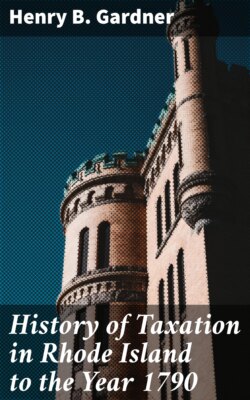Читать книгу History of Taxation in Rhode Island to the Year 1790 - Henry B. Gardner - Страница 3
На сайте Литреса книга снята с продажи.
Introduction.
ОглавлениеTable of Contents
That method of raising revenue for the support of government which we understand by taxation marks a well advanced stage of economic life and is of comparatively recent origin among Germanic peoples. It was unknown while our English ancestors lived upon the continent of Europe and for many centuries after they had settled in their new home Society, and, as a consequence, government had not as yet become differentiated. Some of the most important duties, such as the defence of the kingdom, the care of the bridges and forts, were performed by personal service on the part of the people. Other duties incumbent upon the modern state, those which require the greatest expenditure, had not arisen. The private and public revenues of king were not as yet distinguished. The revenue of his private estates afforded him a considerable income and, in addition, he enjoyed the usufruct of the folkland. The growth of the feudal system gave rise to various other sources of income, and besides these there were payments for special privileges such as markets. The king also enjoyed rights such as that of carriage and purveyance, for example.
Taxation as we conceive it formed no part of the system. "Only in a condition of the deepest degradation, under Athelstan the Unready, could the national assembly be induced to levy a tribute upon the country to buy off the horde of Danish pirates."[1] Taxation developed rapidly after the Norman conquest, but as late as the reign of James I out of a total revenue of about £450,000, £180,000 came from dues on feudal tenures, and the crown lands, rented at much below their real value, yielded £32,000.[2]
Feudal dues remained an important source of revenue until the time of Charles II. All through the early period "the taxes voted were 'aids' and 'subsidies'; something to help the king eke out his income, as it were. Systematic taxation as a right--nay, as a duty owed by the citizen to the State--was an idea entertained with the utmost reluctance."[3] Even after national taxation had become established the local bodies continued to depend on personal service (or payments in kind) to fulfil their military, police, or judicial functions. It was the apportionment among individuals of fines incurred by the various local divisions for the neglect of these duties which first gave rise to the county rate, the hundred rate, and the tithing rate or town levy. From the Tudor legislation of the Sixteenth and early Seventeenth centuries local taxation received a definite form and character. The poor law of 43 Elizabeth which established the parish poor rate became the basis of the system. To this rate all others tended to conform.[4] In early New England the conditions were much the same in regard to taxation as in early England. The functions of government were few and simple and often easiest fulfilled by personal service on the part of the citizens. This was the case with respect to the maintenance of the roads, and with military service. The army was the folk under arms. The duties of public officers, whether of town or colony, could not have been burdensome and in many cases acceptance of office was looked upon as a duty to be performed without, or with small, recompense, refusal being accompanied by a fine. A considerable portion of public services such as those of the executive officers of the courts (and even of the judicial officers) were naturally recompensed by fees. Pauperism the great burden of the older country was hardly possible where land was abundant and labor scarce.
What has been said or New England in general applies with added force to Rhode Island, for here the political body concerned itself as a rule with neither religion nor education.[5] Taxation was regarded for a long time not as the principal means for meeting ordinary expenditures but as something irregular and supplementary.
